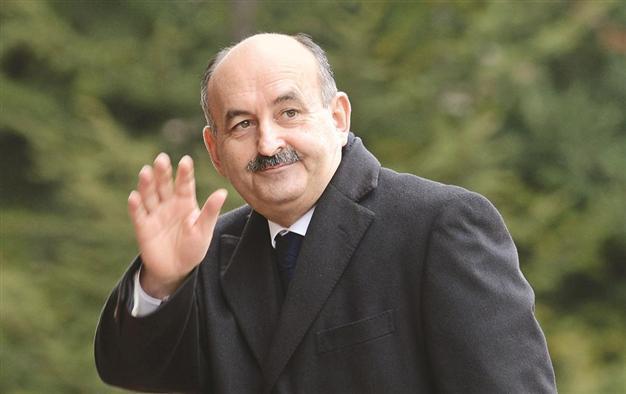Turkish government revises policies for public service
ANKARA

Minister Müezzinoğlu has signaled
a comeback for medical professors. Daily News Photo
The Turkish government is attempting to win the hearts of millions of teachers and health personnel through sharp U-turns from its key policies on education and health after a recent Cabinet reshuffle amid hopes of winning new elections and a potential charter referendum in the coming year.
While Health Minister Mehmet Müezzinoğlu signaled that the government will show flexibility on the much-criticized Full-Day Law that forced thousands of specialist physicians to quit public hospitals, Education Minister Nabi Avcı has softened his ministry’s recruitment policies to benefit thousands of teachers.
“This should not be considered a retreat. And this has nothing to do with the ministerial change. Our target is to provide the best health services to our people by using all of our doctors in the most efficient way,” Müezzinoğlu told private broadcaster CNNTürk yesterday. As a result of the Full-Day Law, thousands of specialist physicians had to choose to leave public hospitals, causing a huge deficit in the number of qualified medical personal.
The new minister hinted that doctors who had their own clinic could continue to work at public hospitals on the condition that they avoid abusing the rights of citizens and in full transparency.
“When I was first appointed as health minister, I realized that the greatest problem was the deficit in the number of doctors and nurses. We need 20,000 doctors and 50,000 nurses. Therefore, we are working on a system to use our doctors to the maximum and provide quality health services to our people,” he said. “That’s why we want to regain all of our doctors across all of Turkey.”
The departure of numerous specialist physicians hindered medical services in Turkey and also hit Prime Minister Recep Tayyip Erdoğan when he underwent an operation late 2011. His surgeon was a specialist who was forced to leave public office due to the strictly implemented law. Even the doctor of former Health Minister Recep Akdağ’s wife was a surgeon who suffered due to the law.
Although the government’s health policies have received support from many, Erdoğan wanted one of his right-hand men to assume the post of health minister, according to officials. Müezzinoğlu, a medical doctor, founded a private hospital in Istanbul in the late 1990s and is now set to implement the City Hospital project, which will be carried out under the partnership of private companies and the public sector.
“We want to make Turkey a model in its region with regard to the service it provides in the field of health,” the new minister said.
Three main changes in education
The appointment of Avcı as the new education minister drew much attention as the departure of his predecessor, Ömer Dinçer, was not expected due to his historic amendment to the education system, known as the “4+4+4,” that especially benefited students opting for a more religious education.
Along with growing opposition to the new educational system, the ministry’s failure in the recruitment of thousands of teachers made the minister and the government a target of the public.
Avcı, a professor of communications, is expected to mend the strained relations with teachers and has already signaled that he will adopt a more flexible policy in recruiting instructors.
The new minister is also preparing to abandon a new dress code issued by his predecessor that allowed casual clothing to be worn in schools under certain conditions. Phasing out the decades-old custom of wearing one-style uniforms in schools raised both political and economic concerns, as many families complained that they could not afford casual clothing. Avcı said they would conduct a survey among parents and review the implementation based on the results.
Avcı, meanwhile, also signaled that Turkey’s thousands of private preparation schools, known as dersanes, could remain open despite Erdoğan’s earlier plans to abolish them. As many of the schools are believed to be in line with the Gülen religious community’s worldview, Erdoğan’s position has been regarded as a move against this community and as part of an ongoing silent struggle between the two.
There were 4,055 firms offering private tutoring services in Turkey last year, according to the education industry report issued by the Union of Chamber and Commodity Exchanges of Turkey (TOBB), and more than 1.2 million students attended private tutoring courses last year. There were just 1,730 such schools in 2000, with 174,496 students.
